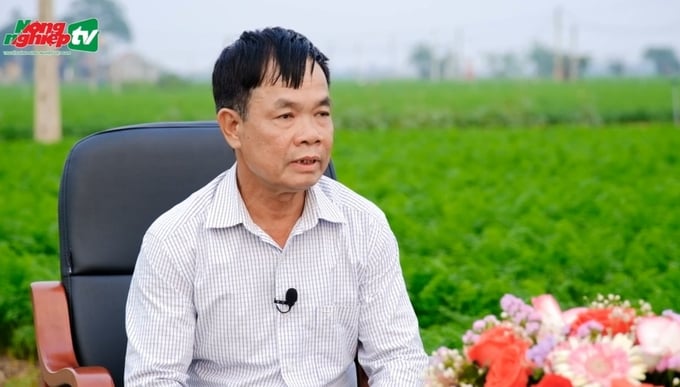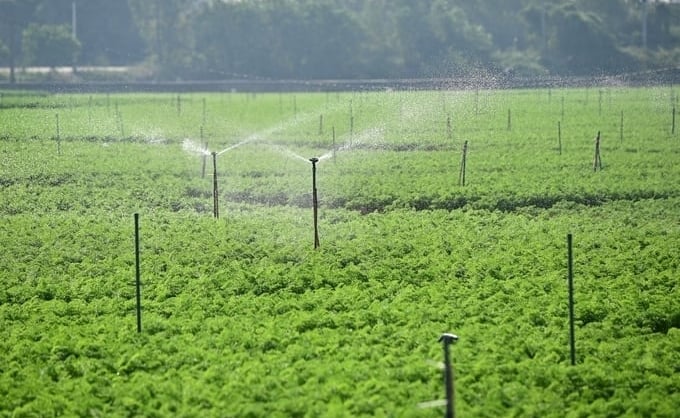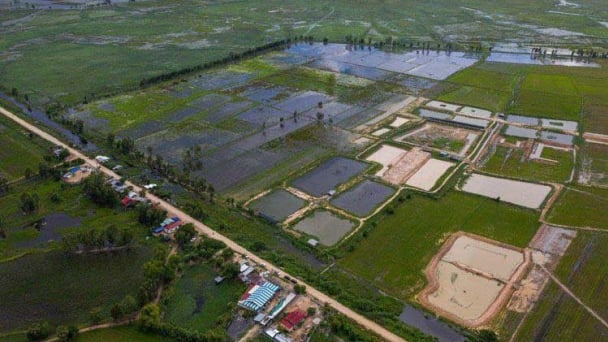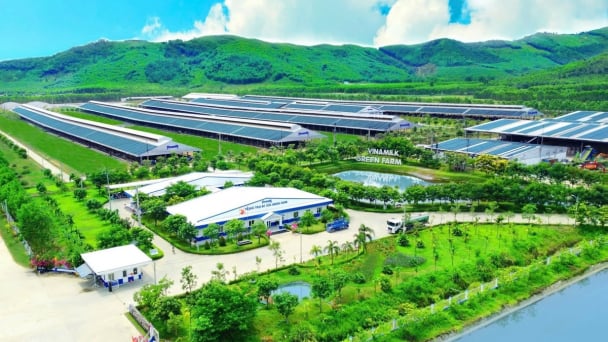May 16, 2025 | 10:32 GMT +7
May 16, 2025 | 10:32 GMT +7
Hotline: 0913.378.918
May 16, 2025 | 10:32 GMT +7
Hotline: 0913.378.918

Mr. Nguyen Van Mich, Director of Cam Van Agricultural Service Cooperative.
Mr. Nguyen Van Mich, Director of Cam Van Agricultural Service Cooperative, Cam Giang district, said that the total area planted with winter crops in Cam Van commune in the 2023-2024 crop year is about 165 hectares.
Up to now, members of the Cooperative have sowed seeds at a basic level. Among them, the main crop is still carrots, accounting for about 150 hectares. The rest are other vegetable crops.
"Before starting to plant, we planned to dredge ditches, repair machinery equipment, and other steps to serve people. It can be affirmed that our Cam Van cooperative has ensured the plan given by superiors," Mr. Mich said.
Carrots are a strong crop in Cam Van commune. Therefore, Cam Van Cooperative has proactively linked up and formed a chain of links with businesses, from production to product consumption. This is the third year the Cooperative has done this.
As a direct producer, Mr. Mich believes that the most important step is consumption support from leaders at all levels. He hopes that the People's Committee of Hai Duong province and the agricultural sector will consider creating all conditions to support people in finding outlets and purchasing products.
"If there is product consumption and a consumer market, then farmers will be excited to produce," Mr. Mich expressed.
It is expected that early carrot tea will be harvested in December. According to Mr. Mich, due to the application of many advanced farming methods and the spread of crops, carrots will be harvested sporadically from now until February 2024.
To increase the value of winter crops, the Department of Agriculture and Rural Development of Hai Duong province has advised people to produce according to safe procedures and GAP and apply integrated measures to prevent harmful organisms.
When it is necessary to use pesticides to prevent harmful organisms, at the same time, adhere to the selection of biological drugs, herbs, and drugs with short quarantine periods and comply with the 4 right principles.
Along with that, Hai Duong Department of Agriculture and Rural Development also advised people to pay attention to changing conditions for export goods. In the short term, the changes will cause difficulties for Vietnamese agriculture in general and Hai Duong in particular.
Mrs. Luong Thi Kiem, Deputy Director of Hai Duong Department of Agriculture and Rural Development, shared: "We determine that disseminating knowledge to farmers is one of the important tasks and will focus on solving it. How can people see the importance of hygiene and food safety?"
Currently, the technical barriers to importing countries are increasing and constantly changing. With state management agencies and specialized agencies directing production, Mrs. Kiem pledged to always coordinate closely with each other, including the Ministry of Agriculture and Rural Development and the Plant Protection Department, to update market information regularly.

Modern irrigation technology, directing water from the Thai Binh River, ensures the water source for carrot fields outside the dyke of Duc Chinh commune. Photo: Tung Dinh.
Hai Duong province will return to guide and direct farmers on the best way to organize production when there are changing requirements or other market signals.
Through many years of experience, Mrs. Kiem realized that the import market is often concerned with two issues. First is the problem of pesticide residues. This is a factor directly related to ensuring food safety and hygiene. The second issue is plant quarantine objects.
Recently, there have been several times when Korea has issued warnings about some pests, not on carrots, but on root crops. This information caused the production chain to stop, affecting farmers.
"There have been years when we have worked very hard to inspect, monitor and confirm that there are no quarantine objects, especially harmful nematodes on carrots, to ensure export activities.", Ms. Kiem continued.
For winter crops to produce and develop sustainably, leaders of the Department of Agriculture and Rural Development believe there needs to be coordination between specialized agencies of the agricultural sector of Hai Duong province and specialized agencies of the Ministry of Agriculture and Rural Development. How to respond promptly to remove difficulties for people and businesses.
In the winter crop of 2023, Hai Duong grows key vegetable crops. Specifically, onions and garlic 6,500 hectares; carrots 1,200 hectares; cabbage, kohlrabi, and cauliflower 4,500 hectares; potatoes 1,000 hectares); corn 1,500 hectares; Other trees 1,500 hectares.
Currently, most winter crops are in the growth stage, developing stems and leaves. Some areas of cabbage, kohlrabi, tomatoes, cucumbers, zucchini, pumpkins, etc., have been planted early in harvesting.
Translated by Tuan Huy

(VAN) Vietnam’s TH Group officially put its high-tech fresh milk processing plant into operation in the Russian Federation, marking a historic moment as the first TH true MILK cartons were produced in Russia.

(VAN) Use of high-quality broodstock and biotechnology is regarded as the most effective approach to ensuring sustainable and economically viable shrimp aquaculture ahead of climate change and the emergence of increasingly intricate disease patterns.

(VAN) Carbon farming is a form of agricultural practices that helps absorb more greenhouse gases than it emits, through smart management of soil, crops, and livestock.

(VAN) This is a key content of the Memorandum of Understanding recently signed between the Vietnam Fisheries Society and Kunihiro Inc of Japan.

(VAN) To achieve the goal, local authorities and businesses in Kon Tum province have fully prepared the necessary conditions for the new Ngoc Linh ginseng planting season.

(VAN) Jiangsu province is gearing up to host training programs in Phnom Penh, the capital of Cambodia, this year to establish the Fish and Rice Corridor.

(VAN) Le Hoang Minh, representing Vinamilk, shared the company's experience in energy saving and green energy transition for production at a workshop held during the P4G Summit.